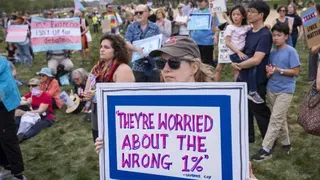January 3, 2014
Housing A Top Issue for 2014
Kilian Melloy READ TIME: 5 MIN.
One of the biggest stories of the last year, San Francisco's housing crunch, will continue to command attention in 2014 as officials and housing advocates address the city's lack of affordable housing and as concerns over evictions and skyrocketing rents remain.
Protests have taken place in recent weeks around tech companies that have received tax breaks for moving into the Mid-Market area, adding employees who often have the means to buy into the high-end complexes that are coming online, while at the same time driving up demand - and rents - for existing housing stock.
Many have looked to gay Supervisor David Campos for help. Campos, whose District 9 includes the Mission and other neighborhoods hit with displacement, recently introduced legislation to address what he's described as "the widespread practice of landlords trying to harass tenants into self-evicting from their homes."
The 11-member Board of Supervisors unanimously passed the legislation December 17. Campos said he thinks the proposal will come up for a second and final vote at the board's January 7 meeting.
He's also been working to craft legislation to increase relocation funds that landlords make available to evicted tenants.
Currently, landlords have to pay amounts starting at about $5,000 per tenant, with an additional approximate $3,400 paid to tenants who are senior or disabled. Such payouts are supposed to occur when tenants are ousted through owner move-ins or similar "no fault" evictions.
Evictions under the Ellis Act have also drawn attention. The Ellis Act is a 1986 state law that allows landlords to evict tenants in order to get out of the rental business. The landlord must remove all units from the rental market.
Campos said details haven't been finalized and the city attorney's office is currently working on the proposal, but "the main objective" is to increase relocation funds "so if people go through an Ellis Act eviction," the money they receive "is sufficient to give them an opportunity to stay in San Francisco."
Campos, Mayor Ed Lee, gay state Senator Mark Leno (D-San Francisco), and others have been working to address the Ellis Act, which has been blamed for many people in San Francisco losing their homes either through actual evictions or threats of evictions.
"We're still trying to work that out," Campos, who is running for Assembly this year, said about what legislation from the coalition would look like.
Board of Supervisors President David Chiu is also running for the Assembly seat, which is currently held by gay Assemblyman Tom Ammiano (D).
In a news release from Lee's office, Chiu stated, "We need serious reform of California's housing laws to keep real estate speculation from displacing more San Franciscans. I am committed to working with Mayor Lee, my colleagues, our state legislative leaders and advocates to ensure that we are protecting tenants and affordable housing."
Previous efforts to modify the Ellis Act have stalled in the Legislature.
Campos said one area of focus is "speculators coming in and buying properties" under the Ellis Act, and evicting tenants in order to make profits.
More recently, in December, Lee's office announced a mayoral executive directive ordering all city agencies with legal authority over permitting or mapping new existing housing to prioritize building and developing "all net new housing including permanently affordable housing."
"Our city's growing economy requires a diverse supply of new housing stock, and San Francisco needs to remain focused on protecting our existing rental housing," Lee said in a statement. "Through the Housing Trust Fund, we created a permanent source of revenue to fund affordable housing production and with our city departments, we are going to build more housing in San Francisco more effectively so our city remains an affordable place to live for people at all levels of the economic spectrum and keep families in our vibrant city."
The fund, which voters approved in 2012, replaces the redevelopment agency and sets aside tens of millions of dollars over the next three decades to support the creation of affordable housing as well as homeownership programs.
Lee has formed a working group that includes the heads of the building inspection and planning departments, the rent board, and other agencies. The group is supposed to "make recommendations to the mayor for city policies and administrative actions to preserve and promote rental housing in San Francisco," among other actions.
Gabriel Metcalf is the executive director of the San Francisco Planning and Urban Research Association, a nonprofit that works to develop solutions to urban policy problems.
In a November interview Metcalf, who mentioned the Housing Trust Fund, said "the pressure on the preexisting housing supply is really heightened" by "how difficult we've made it to add new housing supply."
"When you have a regional economy that is generating jobs - which is generally a good thing - but you've made it really difficult, really expensive, and really time-consuming to add new housing supply, that's a recipe for prices going through the roof and puts a lot of pressure on the existing housing stock," he added.
Evictions can result.
Metcalf said "there is no easy answer" to address the city's housing problems, but "building subsidized, affordable housing" is one "important solution."
He added, "I think in the longer run, the only way to really fix the housing market is to get much, much more housing built" at all income levels "for a sustained period of time."
Homeless
One man who's felt the pinch of San Francisco's housing crisis is Victor Arreola, 58. Arreola, who's gay, had been living at 1049 Market Street, a complex of live-work lofts that's drawn attention since the landlord has been seeking to evict tenants, many of whom are LGBT.
John Gall, one of the building's owners, hasn't responded to the Bay Area Reporter's interview requests, but many believe he is getting rid of tenants so he can take advantage of the city's tech boom.
In an interview last week, Arreola said living conditions at the building had been crumbling - there hadn't been hot water for weeks, among other problems - and he was tired of fighting to hold on.
He left in late November, and ended up being homeless for almost three weeks. That included sleeping on a cardboard box for three nights.
"I froze my butt off," he said.
Arreola, who'd worked at Macy's and had been set to pay $817 a month beginning in November, couldn't find affordable housing in San Francisco.
He's now staying at a friend's home in Kirkland, Washington, near Seattle, for a couple of months. He isn't sure what he'll do after that.
Arreola said Gall "has the right to do what he wants with his property," but "all of a sudden, my whole life has been blown up. I have no plans now. I have no nothing."
Kilian Melloy serves as EDGE Media Network's Associate Arts Editor and Staff Contributor. His professional memberships include the National Lesbian & Gay Journalists Association, the Boston Online Film Critics Association, The Gay and Lesbian Entertainment Critics Association, and the Boston Theater Critics Association's Elliot Norton Awards Committee.






